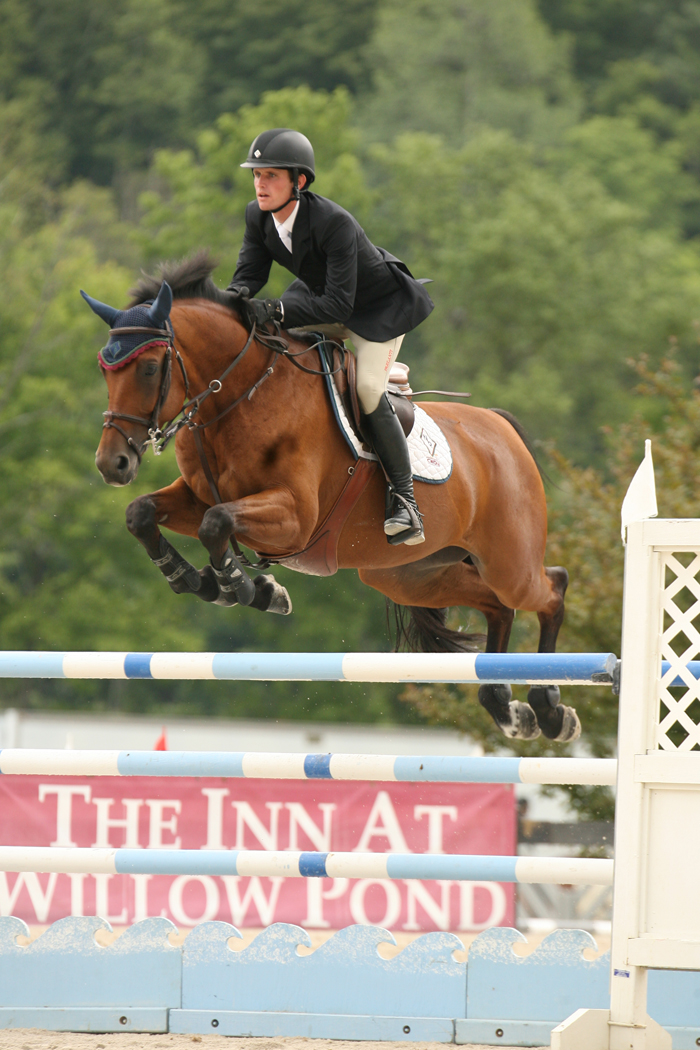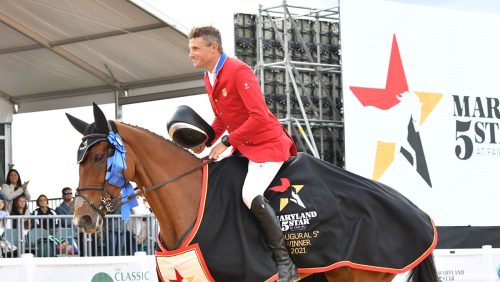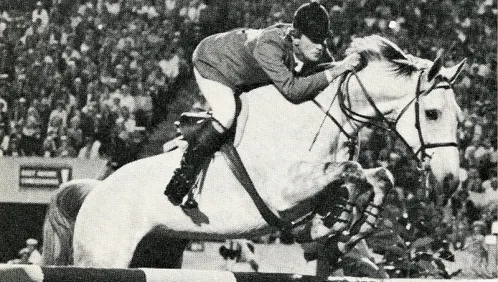You don’t have to show in the equitation division to reap the benefits of its lessons, according to our columnist.
It’s a bit ironic, but I think Irish rider Darragh Kenny is a great example of our American system, with its strong equitation influence, and how incredibly valuable it can be.
This summer, Darragh has not only won multiple grand prix classes, but he’s also done quite well in USHJA International Hunter Derby competition. I found it interesting, and also somewhat perplexing, that we received a fair number of comments from onlookers stating their surprise that Darragh could in fact ride a hunter—and well at that!
Darragh might have been born and bred in Ireland, but for the last four years, he’s been riding for me and my husband, John Brennan, at our North Run in Warren, Vt. He entered into, and embraced, our “system,” and has endured many a North Run group equitation lesson. He joins in on the flatwork frequently, and he does all the jumping lessons.
Last year, I set up a relatively difficult course in the indoor, and he was on one of the green horses. I remember at the end of it, he said, ‘Wow, that was hard!’ He’s not a fan of the work without stirrups, but he has a good time. It’s really helped; I feel strongly that it’s smoothed his riding out a lot. He wholeheartedly agrees.
If on Day 1 I’d said to him, ‘You’re going to ride this wave here for however long, and at the end of it hopefully see the value of pursuing proper equitation and joining in on lessons,’ he might have looked at me and thought I was nuts. But he understands now.
Again, it all comes down to one simple fact: Good riding is good riding. I’m not sure when or how our sport turned into a discipline of many micro-managed compartments. Learning to ride hunters, equitation, or jumpers sometimes seems to become completely separate entities.
I get perplexed and frustrated by the naysayers who say that equitation is a useless division. I totally disagree. Darragh illustrates that; even though he’s not showing in the equitation, he is doing our program and our system, and his ride has become more polished and his position is better. Everything is falling into place, and his results are coming together because of it. He had the talent from the get-go, but our system has taken a talented rider to another level, and that to me is the reason for embracing a system and embracing consistency and proper horsemanship.

Even though he’s Irish, Darragh Kenny shows the benefits of an education in a U.S. equitation system. Photo by David Mullinax
Equitation Is A Platform For Anyone
If you look back in our history, the equitation division has influenced many generations of our country’s best riders. Obviously, I am a huge advocate of the equitation division and the value it holds but perhaps for other reasons than some might think.
ADVERTISEMENT
When we talk about equitation, some people definitely think just in the terms of the classes, but for me, it’s just another day at the job of teaching correct horsemanship. For me, the equitation division is a developmental phase for a rider’s progression. It is NOT a means to an end, but merely a platform for any-aged rider to hone his skills, perfect his position, understand the concept of work ethic and discipline, and recognize the value of a “system,” and what one can achieve through a structured, thoughtful, and consistent program.
Whatever your program, all that matters is that you’re consistent with it. That, to me, is what a system is. It’s a hard sport; nothing’s ever black or white. You’ve got to be ready to change the variables if things aren’t working out. But all in all, the overview of a program, certainly in my opinion, is based on traditional, correct horsemanship.
It’s about the journey, and if the journey ends up at the finals, so be it. But for some people, the goals might be different. Maybe someone’s goal is to qualify for the finals. It’s anybody’s decision whether they want to make that a goal in itself or just be there to have the experience of it.
Winning Isn’t Everything
Frankly, I don’t know who wakes up in the morning and goes to a horse show with the goal to lose. I don’t know anybody who wakes up and thinks that. Everybody wants to win; that’s what keeps us motivated.
That said, there is only one winner every day, but there are degrees of success and personal accomplishment. It just depends on your own situation. Maybe some people’s goal is to learn how to ride better so they can do the adult equitation class. If someone joins us, we don’t say, ‘Our goal for you at North Run is to win the Finals.’ It’s great to make that your goal, but your first task is to learn to ride better. Then, you decide what your goal might be and go from there.
For sure I think some of those last-year juniors who have a shot at winning put a lot of pressure on themselves, but they’ve learned to deal with that. It’s just about how you brought them up in your program, and you let them know that at the end of the day, it’s another day. I’ve said this to many a kid over the years: “Tomorrow morning, if you’ve messed up or won, it’s on you go with the rest of us.”
I’ve never been in a frenzy about one kid or another telling them they have to win. Luckily for me, I rode and competed and showed, and I had the best mother because she also was a horsewoman. And I know it isn’t easy some days. To expect anybody to win is not realistic. You might know you have a shot with certain kids, but at the end of the day, a lot of things have to happen for that win to occur, including luck. There are some variables you can’t control. You just show up as prepared as you can, but you can’t count on anything.
The other component that’s so difficult in this sport is the horse. They have feelings and good days and bad days. They have different levels of athleticism and talent and mental resolve. All those things come into play. You can have the best rider in the world, on a nice horse, but if he’s lacking a little horsepower, and another good rider has one of the best horses, it’s going to be difficult to come out on top.
The Moral Of The Story
ADVERTISEMENT
If you review history, Conrad Homfeld, Peter Wylde, Beezie Madden, Lauren Hough, Nicki Shahinian-Simpson, McLain Ward, Kent Farrington, and Charlie Jayne are a few examples of American riders that came up through the equitation ranks. One could argue that some of their riding styles differ greatly, but they’re all still great riders.
It always comes back to the old adage of form follows function. You can’t ride the best you can ride if you’re flopping all over the horse. If your balance is incorrect, you’re going to balance the horse incorrectly. To me, that’s key. That’s where it all starts.
So…the moral to my long and drawn out essay is this: We here in the United States have one of the best educational systems in place. You may choose to compete in equitation classes or not—that is your choice! But, as proven by some of our country’s top riders, a consistent program of correct horsemanship and proper equitation can enhance any rider’s abilities, opening up many options.
At the end of the day, good riding is good riding.
Missy Clark has been a top trainer of equitation, hunter and jumper students for more than 20 years. Missy grew up in East Aurora, N.Y., and learned to ride from her mother, Doris Clark, a locally renowned horsewoman. Together, they began their business, Fox Run.
As a junior rider, Missy was a working student for Chuck Graham, a well-known Buffalo, N.Y., professional. Missy then went on to ride jumpers with George Morris and Rodney Jenkins and spent some time working for Jimmy Lee. Missy later went off on her own and started North Run. She, along with her husband, John Brennan, has trained multiple equitation finals winners and grand prix jumper riders.
Missy’s an active member of the North American Riders Group and serves on the U.S. Equestrian Federation’s Jumper Committee and on the U.S. Hunter Jumper Association’s Hunter Seat Equitation Task Force.
If you enjoyed this article and would like to read more like it, consider subscribing. The original version of “A Little American Equitation Has Influenced An Irish Grand Prix Rider” ran in the August 27, 2012, Equitation issue. Check out the table of contents to see what great stories are in the magazine this week.















